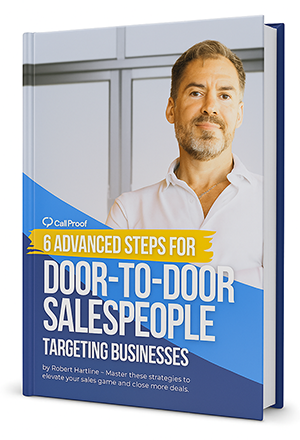People want someone who understands, someone who “gets them.” It’s true in life, and it’s true in sales.
Salespeople aim to solve their customers’ problems. That means you have to empathize with a customer’s situation first. You have to understand the way people think: Why do they do what they do? How do they perceive the problem you’re trying to solve?
That’s the psychology of sales. The better you understand these four principles, the better you understand your customers — which means more sales and more closed deals.
4 Principles to Help You Close More Deals
1. Get to Know Your Prospect
The more you identify with your customer’s frame of mind, the more likely you are to close sales.
Otherwise, you miss the mark. Let’s say I am discussing CallProof with a government organization that keeps track of grant-funded businesses. I won’t talk to them about the sales funnel piece of CallProof. They’re not making sales, so that product feature isn’t important to them. Instead, they need a way to keep track of constituents and customers. That’s where I focus in my pitch.
Your standard pitch doesn’t apply to every prospect — so you need to understand your prospect enough to tweak your pitch to their needs.
2. Use Phrasing Intentionally
The way we use our words matters. So use words intentionally. The way you phrase questions or ask for an appointment impacts their answer.
If you need someone’s email address, don’t blatantly ask for it. Say, “I want to shoot you an email with my contact information. What’s the best email address for you?” (not “I want to send you an email. Can I have your email address?”)
If you’re trying to book an appointment, make it all about the calendar, not the appointment. So say, “What does your calendar look like Thursday at 10?” (not “Do you want to schedule an appointment this week?”)
Trying to get past the gatekeeper? When they ask what you need, reply, “I just want to see what he’s doing after lunch on Thursday.” They’ll hear “lunch” and assume you’re friends.
3. Tell a Story to Get the Sale
The biggest key to success in sales is telling the story of why you exist. What problem do you solve and how has it worked for people?
My story usually sounds something like this:
We exist because we scratched an itch. A lot of businesses have the same itch we had nine years ago. We built CallProof specifically for that. The people who buy software don’t choose the best program, because they’re not thinking about using it in real life – they’re checking boxes…
As I tell this story, I can frame the problem we solve to be similar to the problems I perceive them having. I can also paint the picture of the problems with other products without badmouthing competitors.
Related: Tell the Story, Make the Sale: Sales Conversation Starters to Improve Your Pitch
4. Know When to Say No
This isn’t quite reverse psychology, but saying no sometimes sets you up for a better long-term success. Recognize when your product won’t solve their problem. If it’s not the right fit, tell them no — even if they’re ready to buy.
Often, you’ll still get business out of that interaction. They’ll either refer you to someone who needs your product or remember you positively when their needs change.
Strategies to Skip
In the sales industry, we try tons of different tactics to see what works. In the ’80s, there were some cheesy approaches like a “yes set.” Remember that? Ask three or more questions they’ll say yes to and then tag on your real question at the end (all while nodding along for extra encouragement). That’s not one I’d recommend.
Also, I don’t endorse it, but some people swear by NLP (Neuro-Linguistic Programming). It focuses more attention on using phrases that appeal to the subconscious mind of your clients.
Psychology and Sales Must-Reads
Psychology and sales go hand in hand. So, if you’re looking to dive in a little deeper, check out these resources for further reading.
In You Can’t Teach a Kid to Ride a Bike at a Seminar, David Sandler talks about the psychology of sales and setting expectations. It’s not about faking excitement or lying to your prospect. Instead, he takes a fresh approach to client interaction that focuses more on clients and more on the value of listening.
Influence is the classic book on persuasion. Why do people say yes? Robert Cialdini teaches six universal principles that are the clutch for influencing others. It’s a must-read for salespeople.


